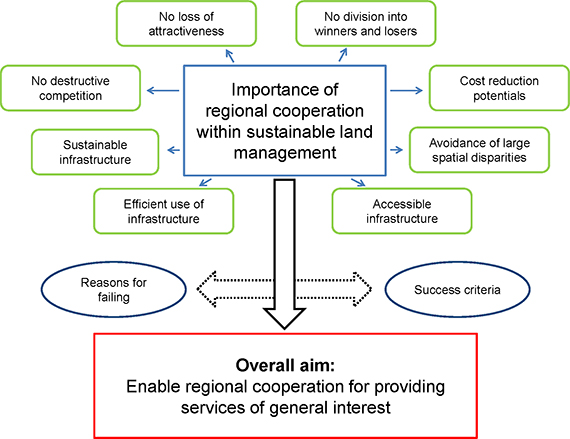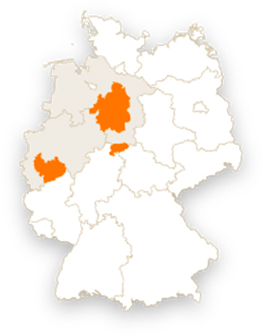Research projects

| Client: | Federal Ministry of Education and Research (BMBF) in the program: „Innovation groups for sustainable development" (promotional reference 033L122) |
| Partner(s): | Institute for Transport Planning and Logistics and the Institute of Technology and Innovation Management at the Technical University of Hamburg-Harburg (TUHH coordination), Financial Science Research Institute at the University of Cologne (FiFo), Academy for Spatial Research and Planning (ARL), County of Göttingen-Osterode, Network Enhanced Economic Area Hannover (Network EWH)/Region Hannover, City of Cologne |
| Time frame: | 04/2015 – 06/2019 |
In Germany, regional planning aims at a balanced development with respect to social, infrastructural, economic, environmental and cultural conditions. For this reason the municipalities have to provide their citizens with services of general interest. However, in many regions it is getting more and more difficult to fulfil this task due to the ongoing demographic change. Particularly the rural areas are strongly affected because the local population is declining and the share of senior inhabitants is increasing. This development is affecting the provision of services of general interest in different areas of the everyday life due to decreasingly limited financial resources within many local and regional budgets.

Illustration 1: Aim of regional cooperation in services of general interest (Source: TU Hamburg-Harburg)
Simultaneously, urbanising processes lead to an increasing population in several city regions. This development can also cause problems, as bigger cities are not able to provide infrastructure and services for the whole region. For solving such negative aspects of parallel occurring processes of growth and shrinkage, it is necessary to come up with innovative cooperative solutions for different municipal and regional administrative departments. Hence, fields like transportation, education or culture need to collaborate for developing innovative strategies. Another important element is the inclusion of the main stakeholders on different local and regional levels.
Aim of the research project: Development and implementation of innovations in the regional management and provision of services of general interest (e.g. health care, public transport, education, sanitation) through optimal support for cooperation between rural areas and city regions.
General conditions like precarious budgets or growing and shrinking population impede many local municipalities to solve these problems on their own. Therefore the research project aims at initialising, supporting and optimising cooperation on a regional level. Thus, services of general interest are able to be provided in a sustainable way to the benefit of the whole region, also in the next years. However, initiation and implementation of such cooperation often encounters various obstacles. These obstacles can be complex and may vary between different regions.
To address such barriers, the UrbanRural Solutions project team applies an integrated approach and incorporates the regional partners as equal members in the interdisciplinary and transdisciplinary research network. This is a key substantive and structural change in comparison to previous projects. The disciplinary backgrounds of the project partners include spatial planning, mobility research, financial science and innovation management. Based on the regional case studies the necessary innovations will be defined. Thus, regional cooperation will not fail but succeed despite of many challenges within the regional management and provision of services of general interest.
Three case study regions are included in the project: Göttingen-Osterode, Hannover and Cologne. All of them are located in the western federal states of Germany. Here, the problem of demographic change and provision of services of general interest is not yet explored in detail in contrast to the eastern federal states. The regions were selected because they differ concerning to their infrastructure, their types of regional administrative organisation and also because of their different composition of existing rural-urban cooperation. This selection ensures that a variety of problems can be examined and that the results can be transferred to other regions.

Illustration 2: Location of the case study regions (Source: www.innovationsgruppen-landmanagement.de)
Based on the research activities and on a continuous dialogue between science and practice, innovative approaches will be developed. Also, additional local and regional stakeholders will cooperate with the research team in order to assure that the approaches are customized for the different needs and problems within each region.
For each region, a structured and comprehensive database with information on supply and demand structures will be composed. The database is the basis for developing an atlas that contains an overview of the individual status quo of services of general interest and their accessibility. It will be produced for each project region and will be available for the regional and local authorities. In addition, a variety of scenarios for the future regional development in the field of services of general interest will be created in order to facilitate the discussions about strategic management. Here, specific action portfolios, measures and projects will be selected. Throughout the process, the inter- and transdisciplinary research network facilitates that existing structures and organisation models will be investigated from different points of view. Thus, a wide spectrum of possible solutions can be developed. A selection of solutions will be tested and applied in order to support and optimise the urban-rural cooperation. The project develops various tools to reach the overall aim.
The “toolbox” is modular and contains different possible solutions and tools for optimising regional cooperation, such as databases, participation processes, scenario tools or strategic dialogues. Thus, regions with similar settings and problems may be able to select suitable tools and adapt them according to their specific circumstances. Thereby, the project aims at providing a long-term, simple, and most particular use of the toolbox, which can be used even after the project has finished.
Publications
- Welsch, Janina; Hellwig, Nele; Schreiber, Sarah (2018): Daseinsvorsorgeatlas in der Region Göttingen. Dortmund
Project leader:
- Dr.-Ing. Dirk Wittowsky
Project team:
- Dr. Janina Welsch
Phone: +49 (0) 231 9051-274
E-Mail: janina.welsch@ils-research.de - Alexandra Bradtke
- Jan Garde
[« back]





